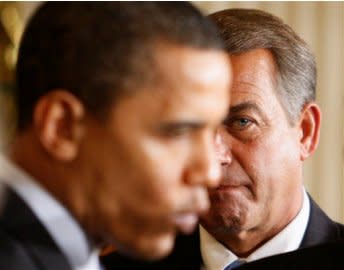 The Ticket
The TicketTougher Congress awaits Obama, Boehner

After the repeal of "don't ask, don't tell," a tax cut package signed into law, and a START treaty headed for ratification, the White House on Wednesday can claim a third lame-duck victory in a row. But times are about to get tougher for Barack Obama -- as well as for Republicans in Congress.
January brings with it a slew of new congressional challenges for the president. Republican numbers will grow next year -- by 63 in the House and six in the Senate-- forcing the president to make more compromises with the GOP.
And divisions within the GOP mean the threat of a government shutdown still looms.
"How Obama positions himself on that is going to be very important," Democratic adviser Bob Shrum told The Ticket. "I think he should look for areas of cooperation, challenge them to cooperate -- I don't think he'll get much -- and then he should be ready for confrontation."
But Obama won't be the only one searching for ways to cooperate.
Senate Minority Leader Mitch McConnell (R-Ky.) and incoming House Speaker John Boehner (R-Ohio) face their own balancing acts in January with the addition of many new tea party faces in Congress.
Tea party groups have been talking about a government shutdown during the lame duck over the omnibus spending bill. And though Congress scuttled that issue for now -- by passing a continuing resolution to fund the government instead -- incoming lawmakers are threatening to bring federal government to a standstill as Congress debates raising the debt ceiling next year.
"It's an inconvenience, it would be frustrating to many, many people and it's not a great thing, and yet at the same time, it's not something that we can rule out," incoming Sen. Mike Lee (R-Utah) told NPR. "It may be absolutely necessary."
This sort of talk evokes memories of the Newt Gingrich-led government shutdown of 1995. Gingrich, then the speaker of a Republican-controlled House, brought government operations to a halt in protest of President Bill Clinton's veto of a federal spending bill. That shutdown, which Gingrich had used as a litmus test for conservatives, backfired on Republicans and damaged Gingrich's reputation as a leader.
With lawmakers mindful of that last high-stakes spending showdown, Boehner -- a member of the 1995 House -- is poised to emerge as a pivotal player in the next fight. And Boehner has indeed flagged the coming spending debate as a defining moment for the 112th Congress when it convenes early next year.
"This is going to be probably the first really big adult moment" for the new Republican majority, Boehner said of the debt limit fight in an interview with the New Yorker's Peter J. Boyle.
He continued: "We'll have to find a way to help educate members and help people understand the serious problem that would exist if we didn't do it."
Boehner suggested to National Journal that he's not willing to repeat history.
"I had a front-row seat to what worked and what didn't in 1994 -- and I like to think I learned a thing or two," Boehner said.
Obama is no doubt also hoping Boehner keeps that sentiment in mind next year. The president, conscious of the debt limit and other fights that lie ahead, has spent much of this lame-duck session advocating compromise.
At the tax-cut bill signing last week, Obama conceded that the worst is yet to come -- for the White House and Congress alike.
"In some ways this was easier than some of the tougher choices we're going to have to make next year," Obama said.
Correction: An earlier version of this story misidentified Sen. Mitch McConnell's title.
(Photo of Obama and Boehner: AP/Charles Dharapak)
